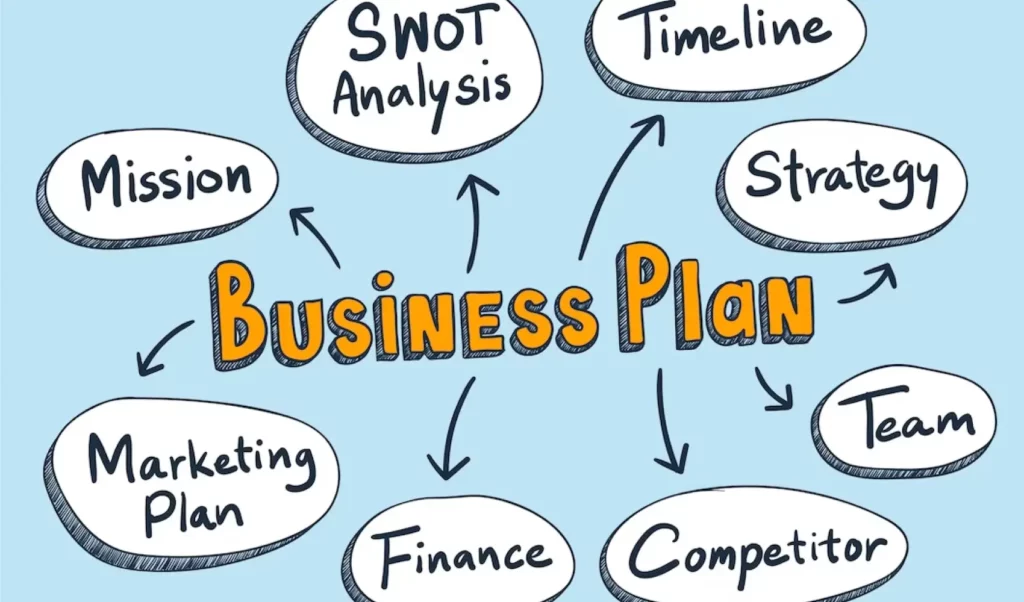In the realm of entrepreneurship, the journey to success is often paved with innovative ideas, determination, and strategic thinking. One of the foundational tools that can significantly impact an entrepreneur’s journey is a good business plan. This comprehensive roadmap not only outlines the path to success but also equips entrepreneurs with the insights and strategies they need to navigate the challenges that lie ahead.
Defining a Business Plan. Write a Business Plan for a New Business
At its core, a business plan is a strategic document that outlines the goals, objectives, and operational strategies of a new or existing business. It’s like a compass that guides entrepreneurs through the complex landscape of entrepreneurship, helping them stay focused and aligned with their mission. A business plan acts as a blueprint, detailing the mission, vision, target audience, and competitive landscape that a business will operate within.

Types of Business Plans
1. Traditional business plan: This is the most common type of business plan, which includes a comprehensive outline of a company’s goals, strategies, target market analysis, financial projections, and operational details. It provides a roadmap for starting and running the business.
2. Lean startup plan: This type of business plan is focused on quickly launching a startup with minimal resources and testing assumptions to gain insights and adjust strategies accordingly. It focuses on essential elements such as problem identification, solution, target market, key metrics, and channels.
3. Internal business plan: Internal business plans are created for internal purposes to guide the day-to-day operations, management, and decision-making within a company. These plans may include operational strategies, marketing plans, financial forecasts, and staffing requirements.
4. Strategic business plan: A strategic business plan focuses on long-term goals, direction, and growth strategies for a business. It includes elements such as market analysis, competitive analysis, strategic initiatives, and resource allocation to achieve the company’s vision.
5. One-page business plan: As the name suggests, this type of business plan is a concise summary of a company’s key elements on a single page. It usually includes an executive summary, problem statement, solution, target market, marketing strategies, and financial projections. It is useful for presenting a quick overview of the business to potential investors or partners.
6. Funding business plan: A funding business plan is specifically developed to raise capital or attract investors for a business. It includes detailed financial projections, investment requirements, exit strategies for investors, and strategies for repayment of loans or raising equity.
7. Growth business plan: This type of business plan is aimed at outlining strategies and actions to grow an existing business. It includes market expansion strategies, product diversification, strategic partnerships, scaling operations, and financial forecasts for growth.
8. Feasibility plan: A feasibility plan assesses the viability of a business idea or project before committing significant resources. It examines market potential, financial feasibility, legal requirements, technical considerations, and risks associated with the venture.
9. Operational business plan: An operational business plan focuses on the day-to-day operations of a business. It includes details about production processes, supply chain management, staffing needs, customer service, and quality control. It serves as a guide to ensure the smooth and efficient running of operations.
10. Exit strategy business plan: An exit strategy business plan outlines the steps and options for exiting a business, such as selling the company, merging with another organization, or going public. It includes valuation of the business, transition plans, and steps to maximize returns for the business owner or shareholders.

Business Plan Template. Elements of a Business Plan
Executive Summary
The executive summary is a snapshot of your entire business plan. It condenses the most important information, including your business’s mission, vision, goals, management team and a brief overview of your products or services. This section is critical for capturing the reader’s attention and giving them a quick understanding of your business concept.
Business Description
Here, you’ll provide a detailed overview of your company’s background, history, team members, and its current status. Describe the products and services you offer and identify your target market and audience. This section helps readers understand your business’s identity and purpose.
Setting Clear Goals and Objectives
Entrepreneurs are dreamers, visionaries who aspire to turn their innovative ideas into reality. However, these dreams need a tangible structure to thrive. This is where a business plan comes into play. By setting clear and specific goals, entrepreneurs can map out their journey with defined milestones when they start a business. Whether it’s achieving a certain revenue target within the first year or expanding to new markets within three years, a business plan ensures that these goals are not just aspirations but actionable steps.
Market Analysis and Understanding
Every successful business begins with a deep understanding of the market it aims to serve. A business plan prompts entrepreneurs to conduct thorough market research and analysis. This process involves identifying trends, customer preferences, and potential gaps in the market. Armed with this knowledge, entrepreneurs can make informed decisions about product development, pricing, and marketing strategies.
Identifying Target Audience
Knowing one’s audience is paramount in business. A well-developed business plan requires entrepreneurs to define their target audience with precision. This involves creating detailed buyer personas that highlight demographics, preferences, and pain points. By understanding their audience, entrepreneurs can tailor their products and marketing efforts to meet specific needs, increasing the chances of success.
Competitive Analysis
In the competitive landscape of business, knowledge truly is power. A business plan guides entrepreneurs to research and analyze their competitors. This involves studying their strengths, weaknesses, and market positioning. Armed with this information, entrepreneurs can differentiate their offerings, capitalize on gaps in the market, and position themselves strategically to gain a competitive edge.

Strategic Planning
An entrepreneur’s journey is fraught with decisions, big and small. A business plan serves as a strategic compass, guiding entrepreneurs through the labyrinth of choices. From deciding on the right pricing strategy to choosing the most effective marketing channels, a business plan provides a systematic framework for decision-making. It ensures that every move is aligned with the overarching business objectives.
Financial Projections
Finances are the lifeblood of any business. A well-constructed business plan includes detailed financial plan and projections. These projections offer a glimpse into the financial health of the business, outlining expected revenues, expenses, cash flow, and profits over a defined period. This information is not only crucial for securing funding but also for managing resources effectively.
Resource Allocation and Management
Efficient resource allocation can make or break a business. A business plan requires entrepreneurs to outline the allocation of resources, whether it’s human capital, technology, or capital investments. This ensures that resources are utilized optimally, preventing waste and ensuring that the business operates smoothly.
Risk Assessment and Mitigation
Every venture carries inherent risks. A business plan prompts entrepreneurs to identify potential risks and devise strategies to mitigate them. By acknowledging risks upfront and planning for their potential impact, entrepreneurs can navigate uncertainties with more confidence.
Marketing Strategy for a Business Owner or Entrepreneur
A business could offer the most exceptional products or services, but without effective marketing and sales strategies, success may remain elusive. A business plan prompts entrepreneurs to craft well-defined marketing and sales approaches that resonate with their target audience.
Operational Plan
Executing a business idea requires a well-structured operational plan. A business plan outlines the day-to-day operations, covering areas such as production processes, inventory management, and customer service protocols.

Timeline and Milestones
Progress needs to be measurable. A business plan incorporates a timeline with specific milestones. These checkpoints provide entrepreneurs with a clear view of their progress, allowing them to celebrate achievements and pivot if necessary.
Monitoring and Adaptation
The business landscape is dynamic, with changes occurring at a rapid pace. A business plan emphasizes the importance of monitoring progress and adapting strategies when needed. Regularly reviewing the plan and its execution ensures that the business stays agile and responsive.
A Traditional Business Plan is Important for a Startup or Small Business. Here’s Why
A traditional business plan is important for several reasons. Firstly, it provides a roadmap for the business and outlines the steps needed to achieve the company’s goals. This plan helps entrepreneurs identify their target market, competition, and unique selling proposition, allowing them to position their business effectively.
Secondly, a business plan helps secure funding from investors or financial institutions. It demonstrates to potential investors that the entrepreneur has thoroughly researched and planned their venture, increasing their chances of obtaining capital. Thirdly, a business plan acts as a documentation tool for the business. It serves as a reference point for entrepreneurs to track the progress of their business and make adjustments accordingly.
Finally, a well-documented business plan can also serve as a communication tool, allowing entrepreneurs to share their vision and goals with stakeholders, employees, and potential partners. Overall, a traditional business plan is vital for entrepreneurs to navigate the complexities of starting and running a business successfully.
Conclusion
In the ever-evolving world of entrepreneurship, a well-developed business plan is akin to a guiding star. It empowers entrepreneurs with the tools, insights, and strategies they need to turn their vision into a thriving reality. By setting clear goals, understanding the market, and crafting actionable strategies, entrepreneurs can navigate the challenges and uncertainties of business with confidence.
FAQs
- Q: Can an existing business benefit from creating a business plan?
A: Absolutely. A well-structured business plan can provide clarity and direction even for established businesses seeking growth and innovation.
- Q: What’s the role of financial projections in a business plan?
A: Financial projections offer a glimpse into the financial health of the business, helping entrepreneurs make informed decisions about budgeting and resource allocation.
- Q: How often should I update my business plan?
A: It’s advisable to review and update your business plan annually or whenever there are significant changes in the business environment.
- Q: Is a business plan only necessary for seeking funding?
A: While a business plan is important for securing funding, it also serves as a roadmap for your business’s growth, guiding decisions and strategies.
- Q: Can a business plan help me identify potential challenges?
A: Yes, a well-structured business plan prompts you to consider potential risks and challenges, allowing you to plan strategies for overcoming them.












